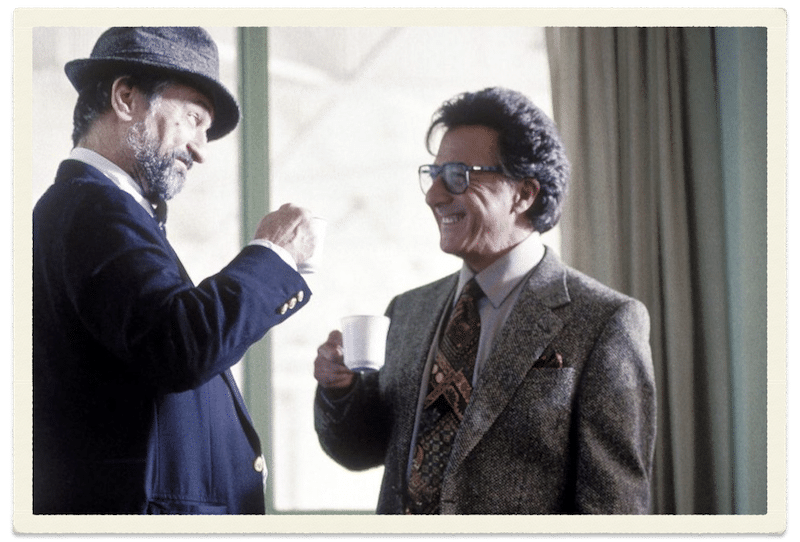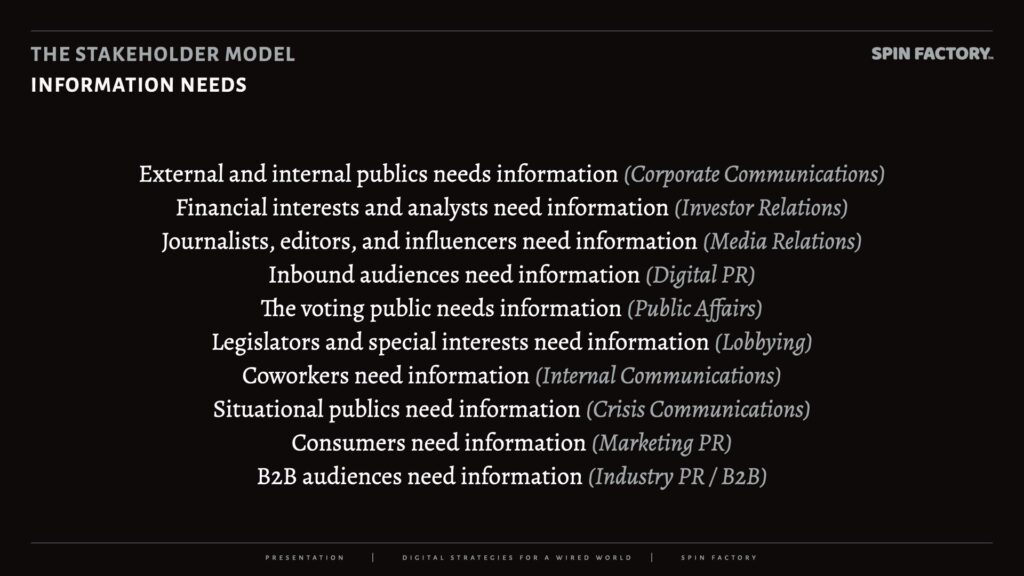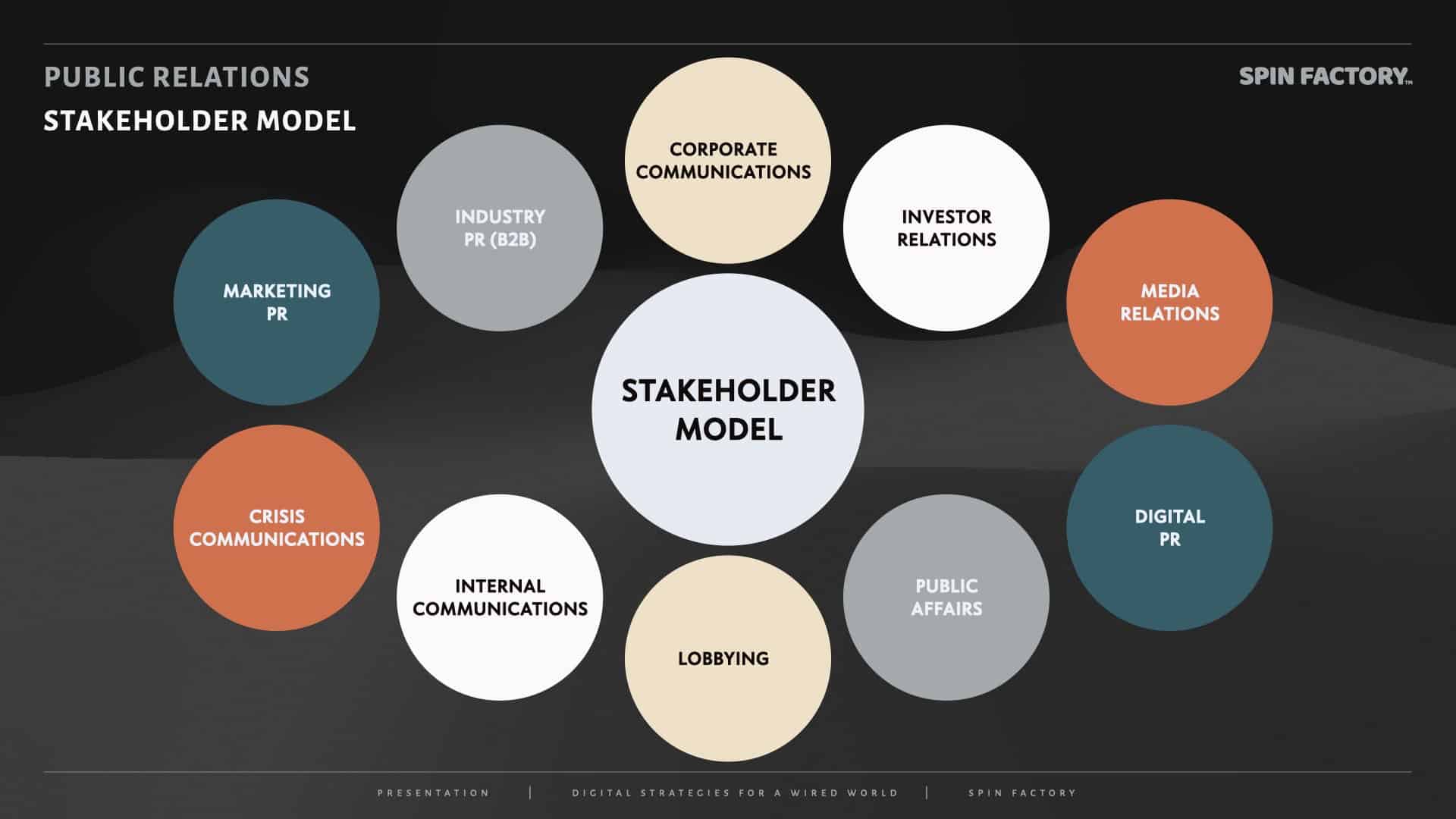Are you considering hiring a public relations agency?
Collaborating with a great PR agency could be your secret weapon.
Having worked at (and with!) many different types of PR agencies, let me give you the basic rundown on how to get it right.
Here we go:
I. How To Work With PR Agencies
Before contacting PR agencies, knowing which type of collaboration format you’re looking for is wise.

(Scene from “Wag the Dog” with Robert De Niro and Dustin Hoffmann.)
There are typically three main formats for working with a PR agency:
Which format of collaboration is best for you?
One standard route is to hire a PR agency for a PR project. If everyone is happy, the PR agency is put on a primary retainer, allowing ongoing PR services at a more beneficial fee structure. For any additional projects, they’re welcome to compete with their proposals. If everyone is happy with the primary retainer and most additional PR projects go to the agency anyway, the agency can be “promoted” to an agency of record. Being a “preferred partner” allows the PR agency to agree on a more beneficial fee structure.
II. The Benefits of a Public Relations Agency
There are many situations where hiring a PR agency is the only way to access certain powers. A few examples would include:
III. Why a PR Agency is Your Secret Weapon
How can a PR agency be a secret weapon?
A PR professional doesn’t think the same way as most other white-collar is trying to steer the conversation towards products and services; the PR professional will instead create stories around topics that people care about.
PR is different. And in a wired world overloaded with a mindnumbing cacophony of marketing messages, different is good.
A PR agency can help an organisation break away from the noise and clutter of traditional marketing tactics and forge genuine connections with its audience. They do this by crafting compelling narratives that resonate on a human level rather than resorting to hard-sell tactics.
The PR approach not only makes an organisation more relatable and trustworthy in the eyes of its audience, but it also sets it apart from competitors. In a world where consumers increasingly seek authenticity and meaningful engagement, a PR agency can be a secret weapon.
IV. Key Services Provided by PR Agencies
PR agencies typically provide services following the stakeholder model:
The Stakeholders in Public Relations
In public relations (PR), we often discuss stakeholders:
Stakeholders = representatives of various vested interests directly or indirectly connected to a brand. 2Silfwer, J. (2021, January 5). The Stakeholders in Public Relations. Doctor Spin | The PR Blog. https://doctorspin.net/stakeholders-in-public-relations/
The PR function is not just about managing media relations or marketing PR; it’s about comprehensively managing relationships with diverse stakeholder groups, each with unique information needs.
Different Information Needs
Why are stakeholders so important in PR?
Marketing is typically tasked with increasing an organisation’s sales of products and services. However, many other information needs must also be met.

Establishing and sustaining relationships with various stakeholders is a significant challenge for PR professionals since their information needs are typically very different.
This requires understanding each stakeholder’s situational perspective, interests, and communication preferences.
The challenge for PR professionals is effectively identifying and addressing these varied needs. It involves crafting tailored communication strategies that resonate with each stakeholder group while maintaining a cohesive core message that aligns with the PR objectives.
“Public relations distinguishes itself from marketing by focusing on the stakeholder-organization relationship, which comprises mutual orientation around a common interest point and a multiplicity of stakes.”
Source: Public Relations Review 3Smith, B. (2012). Public relations identity and the stakeholder – organization relationship: A revised theoretical position for public relations scholarship. Public Relations Review, 38, 838 – 845. … Continue reading
The PR Stakeholder Model
PR professionals have various specialisations (based on the stakeholder model), including corporate communications, investor relations (IR), media relations, digital PR, public affairs (PA), lobbying, internal communications (IC), crisis communications, marketing PR, and industry PR (B2B).

“In a corporation, a stakeholder is a member of ‘groups without whose support the organisation would cease to exist’, as defined in the first usage of the word in a 1963 internal memorandum at the Stanford Research Institute. The theory was later developed and championed by R. Edward Freeman in the 1980s. Since then it has gained wide acceptance in business practice and in theorising relating to strategic management, corporate governance, business purpose and corporate social responsibility (CSR).”
Source: Wikipedia 4Stakeholder (corporate). (2023, October 27). In Wikipedia. https://en.wikipedia.org/wiki/Stakeholder_(corporate)
PR Specialisations (Based on Stakeholders)
PR specialisations are typically named based on which stakeholder type they manage:
Corporate communications = an organisation’s strategic use of messaging to shape its reputation, articulate its vision, and engage with key audiences across internal and external channels.
Targets: External and internal publics, business journalists, regulatory institutions, partners, suppliers, vendors, etc.
Investor relations (IR) = an organisation’s deliberate communication efforts to build trust and maintain transparency with investors, analysts, and the financial community.
Targets: Shareholders, investors, market hubs, market analysts, financial institutions, trade journalists etc.
Media relations = a brand’s targeted use of communication to foster positive interactions with journalists, editors, and media outlets and to gain favourable coverage.
Targets: Journalists, editors, influencers, etc.
Digital PR = the strategic use of online communication to build brand communities, foster engagement, and manage reputation in the digital space. 5Silfwer, J. (2017, November 20). What is Digital PR? Doctor Spin | The PR Blog. https://doctorspin.net/what-is-digital-pr/
Targets: Inbound web traffic, brand communities, subscribers, fans, followers, influencers, social networks, etc.
Public affairs (PA) = a brand’s intentional use of communication to engage with governments, policymakers, and communities to influence public policy and social impact.
Targets: Voters, political journalists, political analysts, columnists, interest groups, etc.
Lobbying = the focused use of advocacy and communication to directly influence legislative and regulatory decisions in favour of specific interests or causes.
Targets: Politicians, legislators, government officials, committees, influencers, etc.
Internal communications (IC) = an organisation’s deliberate use of messaging to align, inform, and motivate employees while fostering a productive workplace culture.
Targets: Coworkers, potential recruits, etc.
Crisis communications = a brand’s rapid, strategic deployment of communication to mitigate reputational damage, address urgent challenges, and restore public trust during critical situations.
Targets: Crisis victims, worried publics, the general public, coworkers, journalists, influencers, customers, shareholders, etc.
Marketing PR = a brand’s tactical integration of communication and promotional efforts to enhance product awareness, drive sales, and support marketing objectives.
Targets: Potential customers, existing customers, trade journalists, members, affiliates, etc.
Industry PR (B2B) = a business’s purposeful use of communication to build credibility, foster trust, and establish thought leadership within its professional sector.
Targets: B2B clients, B2B prospects, trade journalists, trade organisations, niche influencers, etc.
Learn more: Stakeholders in Public Relations
For instance, one agency I worked at (Springtime PR) provided specialised services in corporate communications, internal communications, crisis communications, and public affairs (PA). Another agency I worked at (Spotlight PR) provided specialised services in media relations, industry PR (B2B), and marketing PR. Yet another agency I worked at (Whispr Group) provided specialised services for digital PR.
It would be easy to say that specialist agencies are always better at specific types of PR challenges, but the difference between generalist PR agencies and specialist PR agencies is much smaller than between good and bad PR agencies.
I advise picking a good PR agency over a PR agency with a perfectly matched specialisation.
V. Red Flags When Hiring PR Agencies
Overview of the primary services provided by a PR agency, such as media relations, crisis communications, event management, and more.
VI. Tips for Choosing the Right PR Agency
Accepting that you must make a few fundamental decisions is a good starting point. Depending on your specific PR challenge, you should start by deciding between these preferences:
For instance, knowing beforehand that you’re specifically looking for a Big-Local-Strategic-Generalist-Senior PR agency will guide your decision (and help you ask the right questions!) when searching for the right fit for your organisation.
VII. Why Marketing Agencies Fail at PR
Perhaps your organisation is already working with a marketing agency? Perhaps they can do your PR, too.
I’ve met and interacted with thousands of marketers over the years, and one thing is abundantly clear: they don’t even know what PR is supposed to do. The most common marketing belief is that PR is synonymous with the idea that PR should generate publicity on the back of marketing campaigns.
But perhaps publicity for your marketing efforts is exactly what you’re looking for, anyway?
Unfortunately, for marketing agencies, you can’t use “marketing speak” with stakeholders, influencers, and publics. Not only do they hate it, but they often take offence publicly. And now you’re going from wanting better PR to getting worse PR overall.
Caution: Agencies of all sorts might tell you they’re great at everything — and that you don’t have to make any trade-offs. Err on caution, do your research, and ask follow-up questions. This is sound advice for dealing with any agency, of course.

THANKS FOR READING.
Need PR help? Hire me here.

PR Resource: Free Corporate PR Course
Spin Academy | Online PR Courses

Spin’s PR School: Free Corporate PR Course
Explore this Free Corporate PR Course to learn strategic communication insights and techniques and stay ahead in the competitive public relations industry.
Corporate Communications
Agency Collaboration
Corporate Messaging
Corporate Challenges
Learn more: All Free PR Courses
💡 Subscribe and get a free ebook on how to get better PR.

Annotations
| 1 | A PR agency is typically a dynamic setting with varying high-level PR challenges and a mix of competitive talents. Organisations often cannot match such an environment to attract thrill-seeking PR minds. |
|---|---|
| 2 | Silfwer, J. (2021, January 5). The Stakeholders in Public Relations. Doctor Spin | The PR Blog. https://doctorspin.net/stakeholders-in-public-relations/ |
| 3 | Smith, B. (2012). Public relations identity and the stakeholder – organization relationship: A revised theoretical position for public relations scholarship. Public Relations Review, 38, 838 – 845. https://doi.org/10.1016/J.PUBREV.2012.06.011 |
| 4 | Stakeholder (corporate). (2023, October 27). In Wikipedia. https://en.wikipedia.org/wiki/Stakeholder_(corporate) |
| 5 | Silfwer, J. (2017, November 20). What is Digital PR? Doctor Spin | The PR Blog. https://doctorspin.net/what-is-digital-pr/ |


